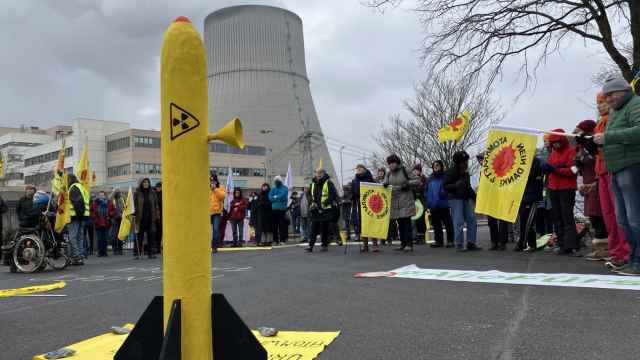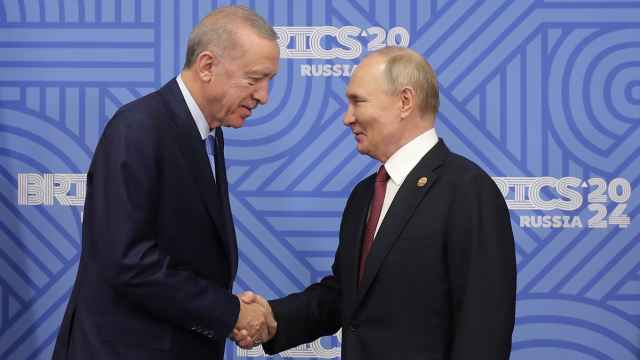Judging by the pre-election activities of Prime Minister Vladimir Putin and President Dmitry Medvedev recently, Putin is enjoying a firm lead. But Medvedev has staged a nice comeback in the past two months — mostly in Moscow courtrooms.
The first hint came in April, when two neo-Nazis, Nikita Tikhonov and Yevgenia Khasis, were given severe prison terms for killing human rights lawyer Stanislav Markelov and journalist Anastasia Baburova.
On Sunday, state-controlled NTV television aired an amazingly balanced report on Khodorkovsky, giving him a nationwide platform to maintain his innocence and to announce his plans to file for parole.
On Tuesday, Rustam Makhmudov, a Chechen native accused of pulling the trigger in Politkovskaya’s death, was arrested. Makhmudov had remained at large since 2006. After moving to Belgium, he returned to Russia despite being on an international wanted list, fueling speculation that law enforcement agencies were offering him some form of protection.
Medvedev, who depicts himself as a liberal lawyer, comes out ahead in all three cases. First, while the Tikhonov and Khasis trial was controversial, it did send a signal that the Kremlin has given up its dangerous dance with radical nationalists. Second, Khodorkovsky is the perfect martyr for liberal voters, who have given up hope on his release. Third, a conviction in the Politkovskaya case would also be a landmark event because the killers of journalists are rarely brought to justice.
Medvedev as he stands today would be a hard sell to voters. But a Medvedev who has freed Khodorkovsky, tamed nationalists and punished Politkovskaya’s killers would look like a strong crusader for the rule of law — a man of action and principle. Although cynics might say the three high-profile cases are just another ruse by the ruling tandem to keep election intrigue alive, Medvedev should not be ruled out as a serious presidential candidate.
But there is a catch. What might appear to be the dismantling of Putin’s legacy is not a dismantling at all. Khodorkovsky, even if given parole for good behavior, will not be acquitted. Investigators might have found Politkovskaya’s killer, but we are unlikely to ever know who ordered the murder. Ultranationalism is still not being fought outside the courtroom. And thousands of other murky cases — such as the death of lawyer Sergei Magnitsky or the beating of Kommersant reporter Oleg Kashin — have not been properly investigated. Most important, the power vertical, along with its creator, is as strong as ever.
Medvedev may stay in the Kremlin without tackling these issues. But if a handful of high-profile cases is all that he has to offer in terms of political reforms, his second term in office will differ little from Putin’s policy of status quo. A second Medvedev term might then be best described as “modernized stagnation.”
A Message from The Moscow Times:
Dear readers,
We are facing unprecedented challenges. Russia's Prosecutor General's Office has designated The Moscow Times as an "undesirable" organization, criminalizing our work and putting our staff at risk of prosecution. This follows our earlier unjust labeling as a "foreign agent."
These actions are direct attempts to silence independent journalism in Russia. The authorities claim our work "discredits the decisions of the Russian leadership." We see things differently: we strive to provide accurate, unbiased reporting on Russia.
We, the journalists of The Moscow Times, refuse to be silenced. But to continue our work, we need your help.
Your support, no matter how small, makes a world of difference. If you can, please support us monthly starting from just $2. It's quick to set up, and every contribution makes a significant impact.
By supporting The Moscow Times, you're defending open, independent journalism in the face of repression. Thank you for standing with us.
Remind me later.





